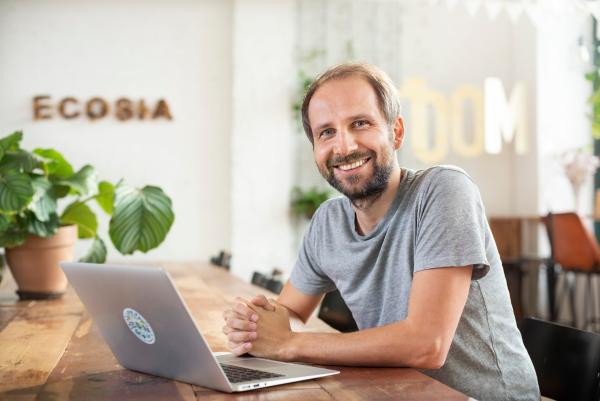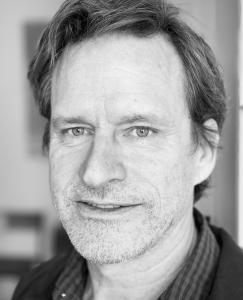A search-engine tree saver funnels earnings into planting, creating jobs and cutting CO2
Growing from a sense of responsibility and an idea, Christian Kroll created a search engine called Ecosia with the goal of using the earnings to plant trees and fight climate change.
A little over a decade and about 120,000,000 trees planted later, he still sounds a little surprised at how well it worked.
“It took us a while to get to this point,” he says of his social enterprise, which is based in Berlin. “We're really planting millions of trees every month. We are now around 80 people, and I think we're making enough revenue to not only sustain the business, but also grow it. And we have the resources to dream.”
Ecosia is the largest search engine with headquarters in Europe. It has more than 15 million users worldwide. Like Google, the largest search engine by far, it earns money by selling advertising linked to searches. But there the similarities end.
Ecosia employees, including Christian, take salaries, but at least 80 percent of profits go to the mission of tree-planting. The rest goes to green initiatives like Ecosia’s seven solar power plants, which produce more than 200 percent of the electricity it needs for searches. Ecosia sells the excess energy back to utility companies and uses the money to plant more trees
Two years ago, Christian and Tim Schumacher, Ecosia’s co-owner, gave away their shares in the company to the Purpose Foundation, creating a “steward ownership” structure to assure that Ecosia can never be sold and that no one, including Christian as the founder, can make a profit or receive dividends from the company.
The company’s dedication to the environment, transparency, and ethics earned it certification in 2014 as Germany’s first B Corporation, which meets the highest standards of social and environmental performance, transparency and accountability. Among the many plaudits Ecosia has won, it was a finalist in the 2015 Social Innovation Tournament, run by the EIB Institute to help entrepreneurs tackles society’s problems.
Immense destruction of planet
The genesis of Ecosia came after Christian finished university in Germany. He spent more than a year traveling, first in Nepal and then in South America during 2007 and 2008. He saw first-hand the poverty in which much of the world lives, and had to confront some ugly realities.
“I saw the immense destruction that we’re doing to our planet, cutting down vast areas of rain forests for cattle farming or soy farming,” he says. It was also during these travels that he learned about climate change and saw the impact with his own eyes.
“I realised this is the biggest challenge of humanity approaching us … and if nobody’s doing anything about it, then probably I should do something about it,” he says. “I realised that planting trees is good for helping nature, it's good for helping people. And it’s also really good to address climate change.”
During his studies, Christian had created a website for comparing banking services; if someone signed up for one of the services, he earned a commission. The site supported his travels and gave him the initial idea to build a search engine as a way to support his mission.
“I realised that most of the money that I'm earning, I was actually giving back to Google for advertisements,” he recalls. “Google has a very clever business model, and has the power to decide who gets visibility and who doesn't. And that is an important power to have, hopefully, a power that will not be abused. But if you use it in the right way, you can actually also enable people to ideally have more climate-friendly behaviours.”
His initial effort, based in Nepal, didn’t pan out. But he continued to develop the idea until Ecosia was born in 2009.

Christian Kroll
A different kind of search engine
The early years were lean, and because Christian had decided not to take investors, growth was slow.
Ecosia made some early decisions that further separated it from Google. All searches are made anonymous within a week, and Ecosia does not sell users’ data to advertisers. Ecosia’s finances are published on its website and, he says, the company pays its share of government taxes and fees where it operates.
In the past few years, interest in the company has grown rapidly, and the number of tree-planting projects has also expanded. Ecosia works with local organisations that do the tree planting, providing jobs and a sense of ownership.
“I realised that if you’re not addressing the reasons why people are cutting down trees, and giving those people other new opportunities, you're not really solving the problem,” he says. “Now we're one of the biggest tree-planting organisations on the planet.”
Maintaining the start-up spirit
Ecosia wants to keep planting more trees. It has embraced other young entrepreneurs, like the founders of Tree Card, a debit card that would use its fees to fund tree-planting through Ecosia. “Suddenly, we had 150,000 people signing up for Tree Cards in the first week or two,” Christian says. Now there’s a waiting list for people wanting the card.
He’s not opposed to earning money — he says Ecosia offers good salaries to its employees. He doesn’t believe people working for environmental or societal issues should suffer.
“I see so many young people now who really have different priorities than I think we used to have 10 or 15 years ago,” he says, adding that Ecosia is always looking for new opportunities to inspire good behaviour. “Because for us, it’s really important that we create an ecosystem where we can all together solve the problem of climate change.”
